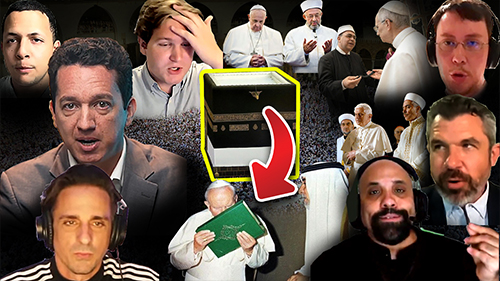| Recent Featured Videos and Articles | Eastern “Orthodoxy” Refuted | How To Avoid Sin | The Antichrist Identified! | What Fake Christians Get Wrong About Ephesians | Why So Many Can't Believe | “Magicians” Prove A Spiritual World Exists | Amazing Evidence For God | News Links |
| Vatican II “Catholic” Church Exposed | Steps To Convert | Outside The Church There Is No Salvation | E-Exchanges | The Holy Rosary | Padre Pio | Traditional Catholic Issues And Groups | Help Save Souls: Donate |  |









 " />
" /> " />
" /> " />
" /> " />
" /> " />
" />




The “Private Interpretation” Objection
OBJECTION- You are acting like a Protestant. The Protestant privately interprets Sacred Scripture, while you privately interpret dogmatic statements.
ANSWER- This objection was refuted in Section 2 of this document, “Believe Dogma As It Was Once Declared.”
But there are a few additional points in refuting and breaking down the utter nonsense and heretical mentality that lies at the heart of this objection. The people who make this assertion don’t understand Catholic teaching or what constitutes fidelity to the Magisterium. In its Decree on the Sacrament of Order, the Council of Trent solemnly declared that the dogmatic canons are for the use of all the faithful!
The word “canon" (in Greek: kanon) means a reed; a straight rod or bar; a measuring stick; something serving to determine, rule, or measure. The Council of Trent is infallibly declaring that its canons are measuring rods for “all” so that they, making use of these rules of Faith, may be able to recognize and defend the truth in the midst of darkness! This very important statement blows away the claim of those who say that using dogmas to prove points is “private interpretation.”
Further, if a Catholic who is going exactly by what the Chair of Peter (the dogmatic text) has declared is not finding the truth, but is engaging in “private interpretation,” as they claim, then what does he go by? Who interprets the dogmatic statement? And who interprets the interpretation of the dogmatic statement? And who interprets the interpretation of the interpretation of the dogmatic statement? And who interprets the interpretation of the interpretation of the interpretation of the dogmatic statement? The answer is that it would never end, and no one could ever arrive at the truth on anything. In that system, the deposit of faith – and the dogmatic teachings of the Church – would then be nothing more than private opinions, which is SHEER PROTESTANTISM.
St. Francis De Sales explained it well against the Protestants.
The “interpretation” ends with the words of the dogma itself! If it doesn’t, then it never ends, as we saw above – you just have fallible interpretation after fallible interpretation after fallible interpretation after fallible interpretation. If the buck doesn’t stop with the infallible definition (the Chair of Peter), then it never stops. I pointed this fact out to a somewhat well-known “apologist” for the Vatican II sect in a telephone conversation. He was arguing that our usage of Catholic dogmatic teaching (the teaching of the Chair of Peter) is like Protestant “private interpretation.” He was saying this in an attempt to defend some of his heretical beliefs which contradict dogma, such as his belief that non-Catholics can be saved. I said to him, “then who interprets the dogma? And who interprets the interpretation of the dogma?” After I said “who interprets the interpretation of the dogma… and who interprets the interpretation of the interpretation… and who interprets the interpretation of the interpretation of the interpretation…” he remained deadly silent for the first time in the conversation. He obviously had no response to the factual point that was made, simply because there is no response. In the heretical view of dogmatic teaching that he espoused, the Catholic Faith is nothing more than Protestantism – fallible, private, human interpretation with no Chair of Peter to give one the final word. The following quotation also illustrates this point very well.
That is why in adhering to exactly what the dogma “has once declared” (Vatican I) one is not engaging in Protestant “private interpretation,” but is rather being most faithful to the infallible truth of Christ and the directly infallible way of knowing it (the dogmatic definitions of the Church). Those who depart from the actual declaration of the dogma, and the actual meaning of its words, are Protestant heretics who engage in condemned, sinful, fallible and private interpretation, against the direct words of the dogma (against the infallible definitions) and thus destroy all faith and render Papal Infallibility pointless. If one can’t go by what the dogmatic statement says, then Christ would have just told us to always follow those with learning or authority; He would never have instituted an infallible Magisterium exercised by the popes, which can clarify issues once and for all times with no possibility of error and regardless of who agrees or disagrees with the definition.
BUT CAN’T MEN MISUNDERSTAND A DOGMATIC DEFINITION?
Of course they can. Men can misunderstand anything. If Jesus Christ (the Truth Himself) were here speaking to us, many people would without doubt misunderstand what He said, just as many did when He came the first time. Likewise, just because some can and do misunderstand what the Chair of Peter is declaring, it does not mean that those who faithfully adhere to its definition are engaging in Protestant “private interpretation.” That is utterly blasphemous against the entire institution of the Papacy and the whole point of dogmatic definitions and the Chair of St. Peter. The dogmatic statements of the Catholic Church constitute the truth of heaven being declared to us directly by the popes.
[1] Denzinger 1800.
[2] Denzinger 960.
[3] St. Francis De Sales, The Catholic Controversy, p. 228.
[4] The Devil’s Final Battle, compiled by Paul Kramer, Good Counsel Publications, 2002, p. 183.
[5] Denzinger 2022.
[6] Denzinger 2054.
[7] The Papal Encyclicals, Vol. 1 (1740-1878), p. 236.
Sign up for our free e-mail list to see future vaticancatholic.com videos and articles.
Recent Content
^